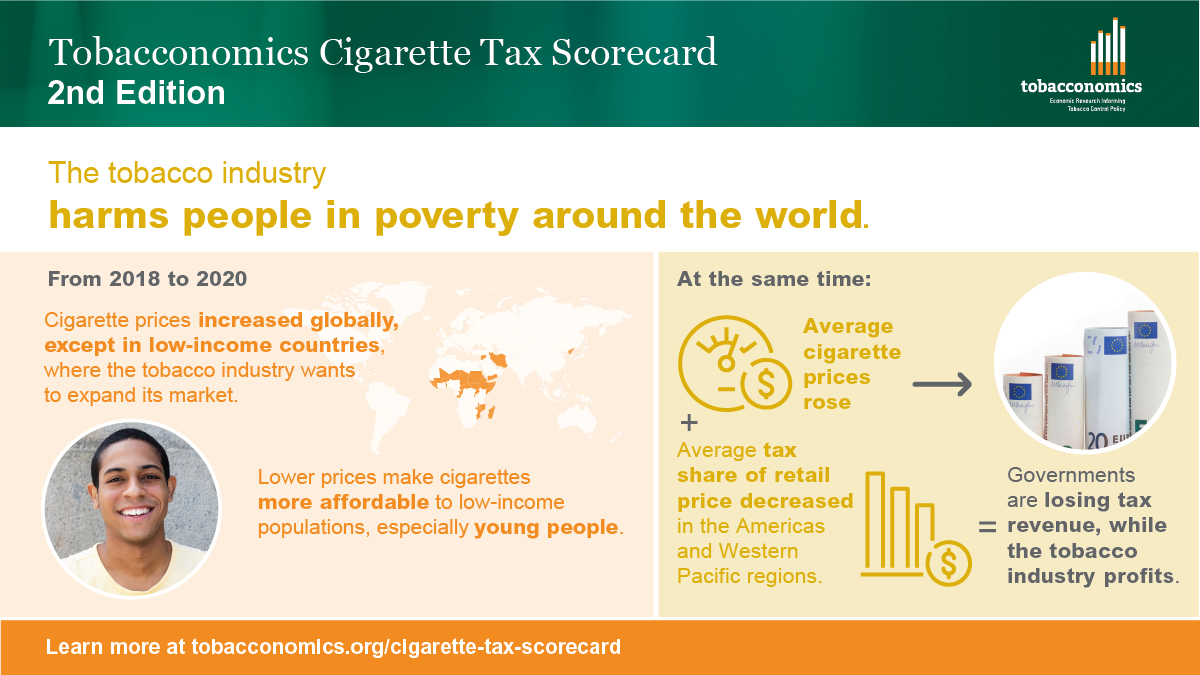
Erika Siu ■ Cigarette Tax Scorecard shows modest progress globally

The second edition of the Tobacconomics Cigarette Tax Scorecard is out today and shows that governments have made insufficient progress in addressing the world’s leading cause of preventable death, despite established evidence that the most effective tool—tobacco taxation—would reduce smoking and increase tax revenues. By using new data from the WHO Report on the Global Tobacco Epidemic, 2021, the 2nd edition of the Scorecard assesses countries’ cigarette tax policies with respect to consistency with the widely accepted best practices of cigarette taxation. The Scorecard is based on four key components: cigarette price, change in affordability, tax structure, and tax share of retail price.
The global average cigarette tax score has barely risen over the past several years from 1.93 (out of 5.00) in 2014 to 2.28 in 2020. Overall scores have improved in 81 countries, stayed the same in 24 countries, and worsened in 48 countries. Only 75 of the 160 countries for which data are available score 2.50 or higher out of a maximum of five points. In this edition of the Scorecard, New Zealand and Ecuador scored the highest with scores of 4.63, followed by United Kingdom and Canada, with scores of 4.38 and 4.25, respectively.
From 2018 to 2020, cigarette prices increased globally—except most notably in low-income countries—where the tobacco industry seeks to expand its market. There, average prices decreased by $Intl PPP 0.28. Lowering these prices makes cigarettes more affordable and accessible to low-income populations, especially young people.
During the same period, while average cigarette prices rose in the Americas and Western Pacific regions, the average tax share of retail price decreased. Thus, revenues that could have been gained by governments through tax increases were captured by the tobacco industry. These regional gains in revenues allow the industry to lower prices in many low-income countries and maintain stable global profits while expanding their markets—even in the midst of the COVID-19 pandemic. Our research shows that despite this economic shock, multinational tobacco companies are now continuing on a business-as-usual trajectory with stable, even growing, profits.

Why Cigarette Tax Revenues Matter
Apart from the fact that tobacco excise taxes affect the bottom-line profits of the tobacco industry more than any other policy, tobacco taxes generate revenues to help governments address the significant public health and economic burdens caused by tobacco-related illness and premature deaths.
However, as the Scorecard shows, most countries’ tax levels are inadequate. Country-level estimates of the economic burden from tobacco illustrate its scale. Recent research by Nayab et al. from Pakistan shows that the economic cost of tobacco-related diseases and deaths in 2019 amounted to Rs 615.07 billion (US$ 3.85 billion), which was five times the tax revenue collected from the tobacco industry (Rs 120 billion) in the same year. Moreover, when health care is publicly funded, the costs of treatment for diseases related to the consumption of harmful products are borne by public budgets and ultimately, others in society. A recent study from Indonesia by Dartanto et al. estimates the direct health care costs from tobacco-related illness to the Social Security Agency for Health and the national health insurance program to be between 0.1% and 0.2% of Indonesia’s GDP.
Given the importance of these taxes to reduce smoking and generate revenues to address its economic and public health burdens, implementing smart tax structures and sufficiently high rates is vitally important. To find out more, check out the Scorecard at www.tobacconomics.org.
Written with contribution from Jeff Drope who leads the Think Tanks project on the Tobacconomics team at the University of Illinois Chicago.
Related articles

What Kwame Nkrumah knew about profit shifting
The last chance
2 February 2026

The tax justice stories that defined 2025

Let’s make Elon Musk the world’s richest man this Christmas!

2025: The year tax justice became part of the world’s problem-solving infrastructure

Bled dry: The gendered impact of tax abuse, illicit financial flows and debt in Africa
Bled Dry: How tax abuse, illicit financial flows and debt affect women and girls in Africa
9 December 2025

The myth-buster’s guide to the “millionaire exodus” scare story


